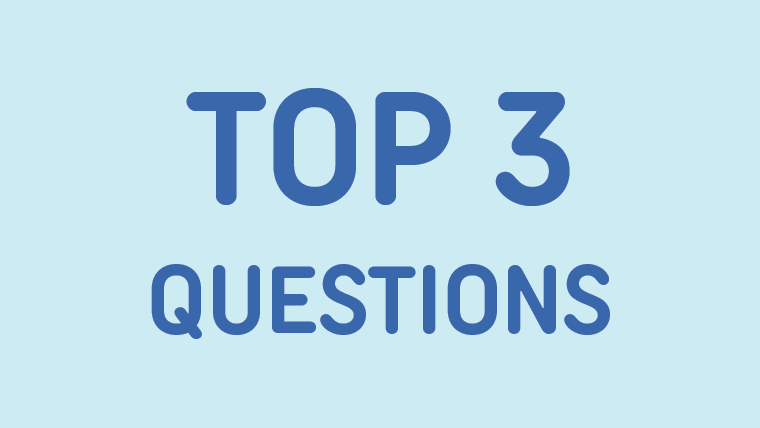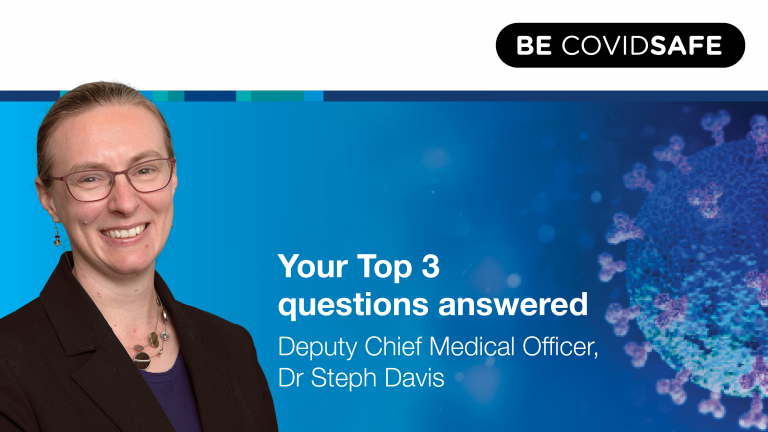
Good day, everyone. My name is Steph Davis and I am a Deputy Chief Medical Officer at the Australian Government Department of Health. I am here to answer your top 3 questions today. Now, before we go any further, I would just like to pay my respects to the traditional owners of the country on which I am sitting today, it’s the Ngunnawal people. I’d like to extend those respects to the traditional custodians of the countries of which other people are sitting on today. I extend my respects to all elder’s past and present and emerging who may be joining us on this call. I extend those respects to any Aboriginal and Torres Strait Islander people who may be viewing this video. Before I go any further from that I would like to do my shout out for today.
My shout out is to all the scientists and the other people working in laboratories across our country. You guys have done an amazing job since the beginning of the pandemic. Scaling up laboratory capacity doing enormous numbers of tests and you continue to do so with the emergence of this new variant. I want to say thank you so much, it’s been an enormously important part of our response and thank you so much.
My first question today is about the Omicron variant, and the question is what does Omicron mean to Australia and how worried should I be? Before I answer this, I would just like to take a step back and talk about what the Omicron variant is. The Omicron variant was designated a variant of concern by the World Health Organisation on the 26 November, so just last week. I’m putting this date there because I want to point out that it is really early days at the moment. What is a variant of concern? A variant is just essentially a slightly different version of the COVID-19 virus. It is when the DNA or the genetic make-up of the virus changes a bit to look a bit different. It can be a variant of interest or a variant of concern and that really depends on how it is designated. Depending on what those changes in the genetic makeup look like. I just want to point out that it’s not unexpected that we get new variants of the COVID-19 virus. All viruses mutate and we know that viruses which are newer tend to mutate more quickly. We have seen a number of previous variants of the COVID-19 virus including Alpha, Beta and Delta. You will probably see a bit of a theme there if you haven’t realised already, they are all named after letters of the Greek alphabet. Back to what makes this a variant of concern. It is basically about what those changes in the genetic make-up of the virus look like. Some of these changes indicate that this variant, this Omicron variant, might be a bit different to previous ones and it might have some slightly different epidemiological characteristics. The problem is because it is so early, we don’t really know how differently this is going to behave in the population. We can make a bit of a guess from the DNA, but we don’t know because it is too early to tell. We don’t really know if it is going to be more transmissible than the Delta variant which is the one circulating in most of the world at the moment. We don’t know if it is going to have a different level of disease severity and we don’t know if it will have a different level or be affected differently by the vaccine. Again, this is because it is really early days. Obviously, this is all a bit concerning and that is why there is work going into this at the moment to try to understand it better. I do want to reassure you Australia is in a really good position to manage this and there are a few reasons for that. One is because as a population we have been outstanding with getting our vaccines, 87% of Australians aged 16 and over are double vaccinated which is incredibly high compared with most of the world. While we are not entirely sure how the vaccine will work against this variant. We are pretty sure it is going to have some level of ongoing effectiveness. Again, that puts us in a really good position. The other thing that puts us in a good position is our labs, we have excellent labs. I mentioned in my shout-out at the beginning of this, but our labs are fantastic, and they have picked up cases of this variant. It travels incredibly quickly, and they will continue to pick up cases. Which enables contract tracing to be done around those cases and try and control spread as much as possible. Again, another thing we have in our favour is contact tracing. We have excellent public health services who do a really great job around contact tracing. I think the final thing we have going in our favour is that we are 20 months into this pandemic or maybe 21 months now. We know what to do, we know how to do our COVIDSafe behaviours. We have been here before and we have learnt a lot. So, in terms of how worried we should be, I think we should probably be alert. We know there is a lot of work going on to try and understand this variant, but I don’t think at this stage we should be alarmed. Finally, we can’t give one of these without giving a shout out to getting your vaccine. Like I said, there’s likely to be at least some level of effectiveness of the vaccine against this variant. Therefore, if you haven’t had your vaccine yet, please book your appointment for today. If you are more than six months down the track from your second dose of vaccine, that means you are eligible for a booster, so think about going out and getting that booster.
My next question is also about the Omicron variant and that is, why has the government introduced border restrictions to some countries? This is really about buying us some time while we learn more about the variant. So, we know that the variant is circulating in high levels in some countries. We know it has been picked up in South Africa. Cases have been picked up in travellers from countries in southern Africa. In a number of different countries around the world. Indicating that variant is probably circulating in those countries as well. In response to this and again this comes back to buying us some time. The government has put in some border restrictions around people travelling from a number of countries in southern Africa to try and slow down the introduction of the variant into Australia while we learn more about it and plan our response from here on. So, those border restrictions have been implemented on the advice of the Chief Medical Officer, Professor Paul Kelly. They concern a number of countries in southern Africa which are listed on the Department of Health website. What they basically say is if you have been in one of those countries in the past 14 days, you cannot come into Australia at the moment. If you are an Australian citizen or a permanent resident or a family member and you do need to come into Australia, then you are able to, but you need to undertake 14 days of quarantine on arrival. If you have arrived say in the last week before these border restrictions were implemented. Before we knew about the Omicron variant. But you were in one of these countries, then you need to go into quarantine until 14 days have passed since you have left one of these countries. So, these are going to be reviewed on an ongoing basis, these kind of border restrictions, and there is a lot of people looking at this and trying to learn about more about this variant as time goes on. The Australian Health Principals Protection Committee are meeting daily to discuss this. As our groups are looking at laboratory aspects of the variant and a whole of other groups around Australia and also around the world. I suspect we are going to learn a lot more about this variant and how we are going manage it moving forward over the coming weeks.
So, my third question today is, what COVIDSafe behaviours do we need for the Omicron variant? I suppose I have some good news for this. It is the same COVIDSafe behaviours we have been using since March 2020. So, I think we all know this of my heart by now, washing our hands, seizing into our elbows. If you have a symptom, go and get tested. If you have symptoms, don’t go to work, don’t go out, stay home so you don’t infect other people. All the things that we know, and we have got so good at doing over the past 21 months, are still going to stand us in good stead for this variant. I think that is about it. Like I said, we are going to know a lot more over the coming weeks and it is really important that we continue to try and get our information as much as possible from reputable sites. In any kind of thing where we are learning a lot at the beginning and where maybe not much is known, there is always people willing to jump in and fill the gaps with information that may not be accurate. I really urge you to go on trusted sites like the Department of Health website, and other trusted sites to make sure you are getting your information from the right place.
So, think that is it now. Just before I sign off, I would like to thank my interpreters today, Ramas and Rebecca. Thank you so much, and thank you, everyone, for joining us and we will see you in a couple of weeks. Goodbye.
Top 3 questions
- What does Omicron mean to Australians and how worried should we be?
- Why has the government introduced border restrictions for some countries?
- What COVIDSafe behaviours will we need for the Omicron variant?







